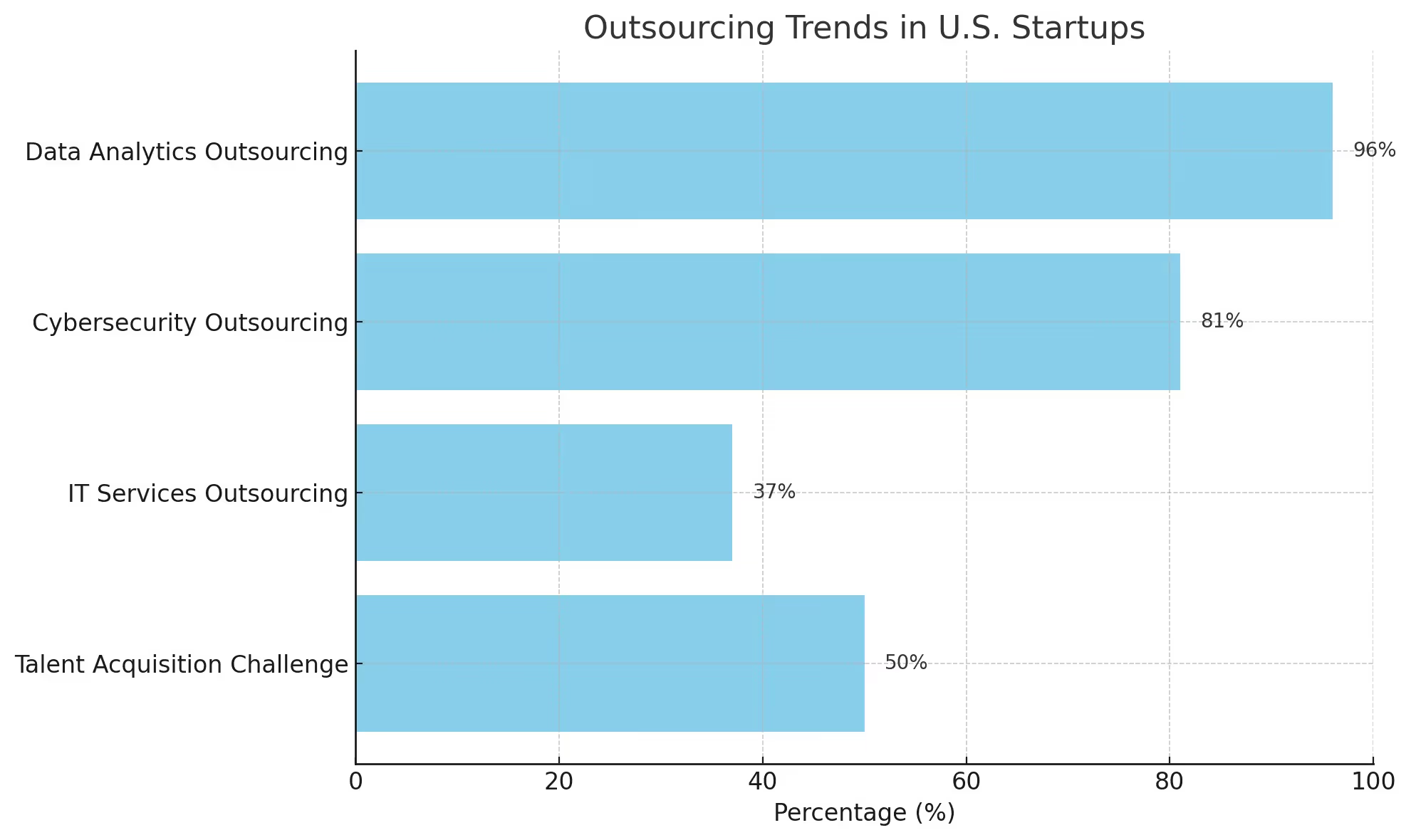Outsourcing software development has become a strategic choice for startups aiming to accelerate their growth while managing limited resources. This approach allows startups to tap into global expertise, reduce costs, and focus on core business activities. However, outsourcing also presents unique challenges that must be carefully navigated to ensure success.
What Is Outsourcing in Software Development?
Outsourcing in software development involves hiring third-party companies or freelancers to handle various aspects of software creation, from coding to testing and maintenance. This approach can range from full project outsourcing, where an external team manages the entire development process, to staff augmentation, where external developers supplement an existing in-house team.
As more startups recognize the benefits of outsourcing, there has been a notable increase in the number of companies relying on international talent pools. Outsourcing is expected to grow 9% per year through 2030. Countries such as Colombia, Brazil, and Mexico have become popular outsourcing destinations due to their highly skilled workforce, competitive costs, and time compatibility with North American companies.

Is Outsourcing Software Development for Startups a Good Idea?
Outsourcing software development is often a beneficial strategy for startups, particularly those with limited in-house technical expertise or tight budgets. The advantages include:
- Access to Expertise: Startups can leverage the skills and experience of seasoned developers without the overhead of maintaining a full-time team.
- Cost Efficiency: Outsourcing can be a financial lifesaver, significantly reducing development costs, especially when partnering with teams in regions with lower labor costs.
- Scalability: Outsourcing allows startups to flex their development muscles as needed without the long-term commitment of hiring permanent staff.
- Focus on Core Activities: By outsourcing development, startups can focus on their core business functions, such as marketing, sales, and customer engagement.
However, outsourcing also has potential drawbacks, such as reduced control over the project, communication challenges due to time zone differences, and the need to protect intellectual property.
Should a Startup Outsource?
For many startups, outsourcing software development is not just a good idea—it’s a necessity. The ability to quickly build and launch a product can be the difference between success and failure in a competitive market. Outsourcing allows startups to:
- Launch Products Faster: With an experienced development team working around the clock, startups can accelerate time-to-market.
- Minimize Risk: By outsourcing, startups can avoid the financial and operational risks associated with building an in-house team from scratch.
- Gain Flexibility: Outsourcing provides the flexibility to experiment with different technologies and development methodologies with talent that resonates with your business.
How to Outsource Software Development for Startup Projects?
By following these steps, startups can leverage the global talent pool effectively, ensuring that their software development projects are completed on time, within budget, and to the required standard of quality.
- Define Project Requirements: Clearly outline the scope, goals, and technical specifications of your project. This step is crucial for aligning expectations with your outsourcing partner.
- Choose the Right Outsourcing Model: Decide between different models such as staff augmentation, project-based outsourcing, or dedicated teams. Each model has its advantages depending on your specific needs.
- Select an Outsourcing Partner: Research potential partners based on their experience, portfolio, and client reviews. Consider factors like technical expertise, communication practices, and cultural fit.
- Set Clear Communication Channels: Establish regular check-ins, reporting structures, and feedback loops to ensure smooth collaboration.
- Monitor Progress and Quality: Use project management tools and conduct periodic evaluations to track the progress of the development and ensure it meets your quality standards.
- Manage Intellectual Property: Protect your startup's intellectual property by implementing robust legal agreements and confidentiality measures.
How Much Software Development is Outsourced?
The use of outsourcing among startups in the U.S. has been significantly driven by the need to access specialized talent, manage costs, and rapidly scale operations. According to Deloitte, the trend shows that over 50% of executives now consider talent acquisition as a critical challenge, leading to increased reliance on outsourcing, especially in areas like IT services, cybersecurity, and data analytics.
A significant portion of software development is outsourced globally, with around 37% of small businesses relying on outsourced IT services. The trend is particularly strong in the United States, where the outsourcing market is substantial. Startups often outsource to access specialized skills, reduce costs, and expedite product development.
In recent years, Latin America has emerged as a key player in the global outsourcing market, with countries like Argentina, Mexico, and Colombia becoming preferred destinations due to their skilled workforce, cultural alignment with the U.S., and favorable economic conditions.

FAQs
1. Is outsourcing software development a good idea for my startup?
Yes, if you want to access specialized skills, reduce costs, and focus on your core business functions, outsourcing can be an excellent strategy.
2. What are the main challenges of outsourcing?
The main challenges include managing communication across time zones and ensuring project control.
3. How can I choose the right outsourcing partner?
Look for partners with relevant experience, a strong portfolio, and positive client reviews. Also, consider their communication practices and cultural fit with your team.
4. What are the cost implications of outsourcing software development for starups?
Costs can vary widely based on the project's complexity, the location of the outsourcing team, and the outsourcing model chosen.
5. Should I choose nearshoring or offshoring?
Nearshoring provides the advantage of similar time zones and easier communication, while offshoring offers access to a broader talent pool and potentially lower costs.
6. How do I protect my intellectual property when outsourcing?
Use solid legal agreements, including non-disclosure agreements (NDAs), and work with reputable partners who prioritize security.
Conclusion
Outsourcing software development can be a powerful strategy for startups looking to innovate quickly and efficiently. By carefully selecting the right partner and managing the outsourcing process effectively, startups can overcome many of the challenges associated with software development and position themselves for long-term success while gaining the advantages of working with talent from Latin America that matches the company's time zone, values, and business model.
Use the pricing calculator below to quickly see how cost-effective it can be to outsource to software developers.







